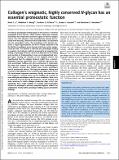Collagen’s enigmatic, highly conserved N -glycan has an essential proteostatic function
Author(s)
Li, Rasia C; Wong, Madeline Y; DiChiara, Andrew S; Hosseini, Azade S; Shoulders, Matthew D
DownloadPublished version (1.299Mb)
Publisher Policy
Publisher Policy
Article is made available in accordance with the publisher's policy and may be subject to US copyright law. Please refer to the publisher's site for terms of use.
Terms of use
Metadata
Show full item recordAbstract
© 2021 National Academy of Sciences. All rights reserved. Intracellular procollagen folding begins at the protein’s C-terminal propeptide (C-Pro) domain, which initiates triple-helix assembly and defines the composition and chain register of fibrillar collagen trimers. The C-Pro domain is later proteolytically cleaved and excreted from the body, while the mature triple helix is incorporated into the extracellular matrix. The procollagen C-Pro domain possesses a single N-glycosylation site that is widely conserved in all the fibrillar procollagens across humans and diverse other species. Given that the C-Pro domain is removed once procollagen folding is complete, the N-glycan might be presumed to be important for folding. Surprisingly, however, there is no difference in the folding and secretion of N-glycosylated versus non-N-glycosylated collagen type-I, leaving the function of the N-glycan unclear. We hypothesized that the collagen N-glycan might have a context-dependent function, specifically, that it could be required to promote procollagen folding only when proteostasis is challenged. We show that removal of the N-glycan from misfolding-prone C-Pro domain variants does indeed cause serious procollagen and ER proteostasis defects. The N-glycan promotes folding and secretion of destabilized C-Pro variants by providing access to the ER’s lectin-based chaperone machinery. Finally, we show that the C-Pro N-glycan is actually critical for the folding and secretion of even wild-type procollagen under ER stress conditions. Such stress is commonly incurred during development, wound healing, and other processes in which collagen production plays a key role. Collectively, these results establish an essential, context-dependent function for procollagen’s previously enigmatic N-glycan, wherein the carbohydrate moiety buffers procollagen folding against proteostatic challenge.
Date issued
2021Department
Massachusetts Institute of Technology. Department of ChemistryJournal
Proceedings of the National Academy of Sciences of the United States of America
Publisher
Proceedings of the National Academy of Sciences
Citation
Li, Rasia C, Wong, Madeline Y, DiChiara, Andrew S, Hosseini, Azade S and Shoulders, Matthew D. 2021. "Collagen’s enigmatic, highly conserved N -glycan has an essential proteostatic function." Proceedings of the National Academy of Sciences of the United States of America, 118 (10).
Version: Final published version